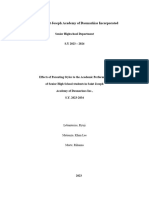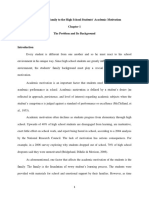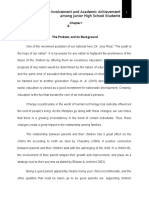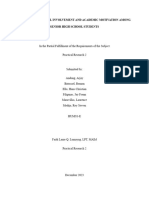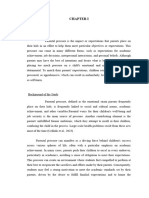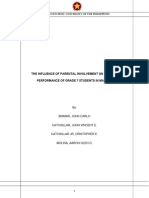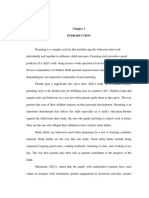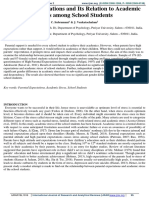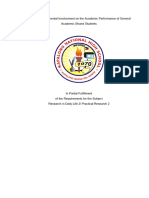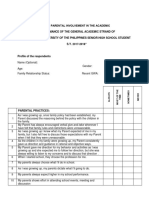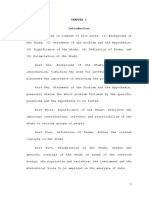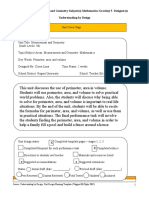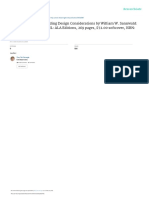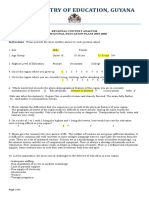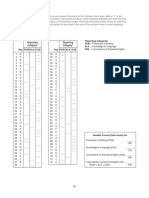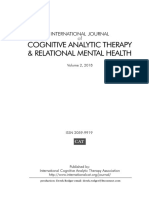Chapter 2
REVIEW OF RELATED LITERATURE
This chapter presents a review of literature both foreign and local.
Included in this chapter helps familiarizing information those that were relevant and similar to the
present study.
Related Literature
Family serves as the fundamental structure of the society that has an important role in one’s life.
Secondary school students nowadays are different from other generations. They tend to be more prone in
being indecisive in their academic performance towards their future career. Although affected by society
and peers, children are greatly influenced by family. Parents have an important role in identifying
children’s talent and guiding them towards their education. Correct and well-balanced relationship
between parents and their children and how parents communicate with children are considered the most
fundamental factors among various factors that affect children’s academic performance.
Local Literature
In a nutshell, the present paper revealed that neuroticism and authoritarian paternal parenting
style were significant correlates of selected Filipino’s career choice. A research by Datu, J.A. (2012)
reveals that neuroticism and authoritarian paternal parenting style were also found out to be predictive
determinants of career choices. By employing a descriptive-predictive research design, the researcher was
able to illustrate how one’s occupational orientation can be predicted by distinct factors like gender,
personality traits and paternal parenting style. The findings will be of great significance to counseling
psychologists in holistically understanding various factors which could possibly contribute to career
decision making. For instance, since it was found out in the study that Neuroticism was a significant
predictor of students’ adjustment, it is recommended for counseling psychologists and school counselors
to evaluate emotional stability of individuals when choosing career courses and other pertinent
transitions. In view of the fact that Authoritarian paternal parenting style was identified as a predictive
factor in career selection, it is imperative to uncover dimensions of the said fathers’ child-rearing practice
that are paramount in better inclination to children’s career decisions. It is suggested as well for guidance
counselors to devise counseling programs that will advocate collaboration with parents in guiding their
respective children towards building a healthy career developmental path. Consequently, the possibility of
[Chapter 2] |1
�increasing the number of secondary school students who will experience an enduring sense of subjective
wellbeing and career satisfaction can be realized.
Meanwhile, according to Alampay, N.D., Filipinos are believed to be competent when it comes to
educational attainment. However, in order for students to attain high academic achievement, there is need
for positive parenting and proper guidance in school. In the Philippines, most parents possess
authoritarian attitude in which they set high expectations on their children’s academic achievement
without considering their children’s flexibility in dealing with school demands.
Foreign Literature
According to Kerr, Stattin, Ozdemir (2012), in the analysis on parenting and adolescent behavior:
there are a lot of concentrations on reciprocal, bidirectional, and transactional processes. However,
parenting-style research still adheres to a simplex perspective whereas parents have an effect on youth
behavior but are unaffected by it. Results showed that through the parental activity – links between
behavioral control and adjustment capability of children rose. Children through adolescence adjustment
additionally expected changes in authoritativeness a lot of robustly than authoritativeness predicted
changes in adjustment. Thus, a parenting style cannot be considered constant to a secondary school
student.
A research by Jensen and Dost-Gözkan, (2015); Pérez et al., (2016) proves that the development
of adolescents’ autonomy, in turn, can have effects on parent–adolescent relationship features. Parents
and adolescents expect increasing autonomy with age, but adolescents typically demand autonomy earlier
than their parents are ready to grant it.
Another study on the topic by Abdorreza Kordi and Rozumah Baharudin (2010), maintains that
studies highlighted students who pointed out their parents as authoritative had better academic
performance as compared to authoritarian and permissive parents. There are several characteristics of the
authoritative approach that are helpful in positive academic outcomes.
Potentially, most secondary school students with achievements in the academic field are
competitive and works more efficiently under authoritative parenting style. However, not all secondary
school students respond the same way to the authoritative treatment; a number of students also reach their
potentials without being pressured to attain success. Thus, in order to discover which parenting style a
child wherein a child performs best – a parent must see first where the child responds in comprehensive
and behavioral means.
[Chapter 2] |2
� Abdorreza Kordi and Rozumah Baharudin (2010) has also concluded in the related study that
developments in the field of parenting and family studies had further reopened the interests regarding the
relationships between children’s academic performances and parenting style; thus, it arose a need for
increasing studies about children’s academic performance.
A study by Assadi et al. (2011) reported that frequency was lower for authoritative parents and
higher for authoritarian parents—but only authoritative parenting was linked to intensity. Thus, it
supports the initial statement that conflict intensity and frequency both should be examined, and further
studied along with the research about children’s academic performance.
A research by Barnhart (2013), on the contrary, explains that permissive parenting is effective
compared to those of secondary school students with authoritarian and authoritative parents. Although,
Barnhart (2013) also pointed out that children of permissive parent usually make the lowest grades in
school, due to the lack of expectations that is not given to them by their parents.
A related study by Moore (2011) proves that children of permissive parent are known to be
highly involved in extracurricular activities in school, thereby, losing concentration in classes.
Another research on this subject by Bush and Peterson, (2013) further explains that Authoritarian
parents provided too much strictness and supervision for their children, while indulgent and neglectful
parents provided insufficient monitoring and guidance. Adolescents with non-authoritative parents are
more likely to desire for more behavioral autonomy which is not satisfied in an appropriate way.
In order to not stray away from school-related activities, parents should help their child set a goal
as they are young and unaware of how their behavior affects their academic performance. This guidance
can pressure and put expectations in a secondary school student whereas it can be understood in different
ways. Secondary school students may either react accordingly to the parents’ expectations, or take the
pressure negatively: causing them to fall in a downward spiral as they struggle to fulfill and impress the
supposition of academic performance the parents had laid out for them. In these kinds of situations, a
parent must be ready to provide warmth to the secondary school student.
Although data from multiple researches indicate that authoritarian, permissive and neglectful
parenting styles are negatively associated with school performance, contrary to the authoritative parenting
style which has been consistently related to an enhanced academic achievement; additional researches
regarding the topic are mandatory.
[Chapter 2] |3
� A study by Mehrafza (2016) investigated the association between parental styles and creativity
and academic performance of secondary school students and found that there was a substantial positive
relationship between the social environment of the household: the deterioration in the values of
democracy and creativity. Moreover, there was a markedly unfavorable association between the ideals of
innovation and tyranny, and there was no statistically significant relationship between the family's
emotional situation, the decline in total freedom, and creativity.
A research by Abedi et al. (2010) looked at the relationship between the reasons for the
educational success of Isfahan high school students and their family characteristics from Iran. The results
showed that from among family factors associated with educational achievement, motivation, parents’
expectations of children's success; authoritarian parenting style and family structure (modern natural
family) explain educational achievement motivation the most.
However, the latest study by Dittman (2011) supports the statement that two dimensions of
parenting styles (i.e. parental warmth and responsiveness) are effective strategies when children are in
distress. It can be suggested that both home environment and parenting styles are possible predictors of
academic performance in young children.
Parenting style significantly influences the understanding, behavior and school achievements of
the children, as family is the first exposure a young offspring receives from the day of his or her birth.
Therefore, the creativity and skills of secondary school student should be nutrified by the first role models
in their household: parents. Parents supposedly maintains and nourishes the innovativeness and artistry of
their young – providing constant support and inspiration to a secondary school student’s imagination.
This will encourage productivity within a child both in their daily life and academic performance. Such
firm parenting style creates a positive response of secondary school students towards attaining academic
success.
In another study on this topic, Yeung et al. (2016) suggested that high parental warmth is
correlated with the child's favorable acceptance, which encourages the child's self-approval. Moreover,
parental strenuousness encourages the production of skill and achievement in crucial areas of the
secondary school children's life, which are a source of self-esteem.
A secondary school student fulfills a goal when he or she receives an academic award they have
been working hard to attain. This achievement fuels his or her satisfaction with themselves, enabling them
to believe their capability and skills – enhancing their self-confidence. Moreover, an achievement of the
child delights a parent; depending on their level of expectations.
[Chapter 2] |4
�[Chapter 2] |5


